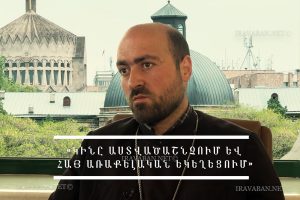30 years have passed since the entry into force of the Charter and all 47 member states of the Council of Europe have ratified it. According to Mr. Andreas Kiefer, Secretary General of the Congress of Local and Regional Authoritie, there s no need of a “new” Charter. These and other details about the charter, in an exclusive interview of iravaban.net with Andreas Kiefer
- The European Charter of Local Self-Government of the Council of Europe entered into force on 1 September 1988 that is 30 years ago. The Charter is aimed at the development of local democracy. If we look back, can we say that the Charter serves its purpose?
The European Charter of Local Self-Government is the Council of Europe’s main legal instrument for strengthening local democracy across the European space. It enshrines the fundamental principles for the good functioning of local governments, such as the need for properly defined powers and responsibilities, and adequate financial resources as well as the conditions of office of local elected representatives, their ability to exercise their functions freely and their right to form associations.
The Charter provides local and regional authorities the legal framework in which they can best exercise their duties and responsibilities serving the citizens.
The Charter was envisaged as early as the 1950s but was finalised and opened for signature only in 1985. At that time, it was only valid for the “old democracies” of Western Europe. It is the accession of the former Eastern countries to the Council of Europe, since 1990, which has totally changed its scope, relevance and importance. All the new democracies of Central and Eastern Europe have ratified it and then applied very quickly, which has made it possible to develop local democracy, previously non-existent, in these countries.
It is therefore during these years of change in the continent that the principles contained in the Charter have become a European standard. The relationship between State and local authorities, which was the very foundation of the principle of subsidiarity and the principles enshrined in the Charter, has gradually developed in all countries. The rights of local authorities have improved in law and in practice.
Of course, much remains to be done, but there is still a tangible reality: that is the recognition of these rights in our Member States, and we owe it to the Charter and, of course, the work of the Congress to promote this text and ensure its application in the 47 Member States
Local and regional authorities have now become important players in the elaboration and implementation of national and European policies. They are also unavoidable when it comes to maintaining cohesion, security, social stability and equality in our societies. So indeed, from this point of view I do consider that the Charter serves its purpose very well.
- 30 years have passed since the entry into force of the Charter and all 47 member states of the Council of Europe have ratified it. To what extent is the Charter in line with current developments? Do you think there is a need to change it or to adopt a new Charter?
Indeed the Charter has been ratified by all 47 Member States which makes it as a key convention, and on 1 September 2018 the Congress, the Parliamentary Assembly and many municipalities and cities all over Europe celebrated the 30 years since its entry into force.
The Charter has become a benchmark text and a goal to be reached for the member States. I am not convinced that a “new” Charter is needed. The provisions of the existing text are still valid. It is quite a modern text. However, as you stressed, 30 years have passed since its entry into force and it is clear that we need to raise awareness on this text in the light of a continuous and contemporary interpretation and application.
The Congress has set itself the goal of not only ensuring the implementation of the Charter, but also of making it a truly dynamic, living document that inspires territorial policies throughout Europe.
How have we obtained recognition of and respect for this text? By being present on the ground – we regularly organise visits to Member States aimed at monitoring the implementation of the Charter or at observing local and regional elections and we use our findings from these missions to develop co-operation programmes that we implement in Member States.
In recent years, democracy and fundamental rights have started to be questioned in some countries. We have witnessed a loss of confidence in our institutions, and current protests in several Member States such as France illustrate this mistrust.
Strong local and regional authorities with clear powers and appropriate resources can make a significant contribution to help ease tensions and contribute to stability and more democracy. This is what the Charter is about and this makes it more relevant and indispensable than ever.
Our monitoring visits and cooperation programmes contribute to provide a contemporary reading and interpretation of the provisions of the Charter. I firmly believe that it is absolutely necessary to assess its implementation on the ground, in the 47 member States, if we want to issue realistic recommendations that are in line with the political and economic reality of the visited country. The Charter is not a static text and it is up to the Congress to give life to this text and to make it evolve over the years so that it does not go out of date.
- Our readers will be interested to learn about the history of establishment of the Congress of Local and Regional Authorities, its role, structure and priorities.
The Congress is the second political Assembly of the Council of Europe – the first one being the Parliamentary Assembly. It is a forum of local politicians, an assembly of mayors and councillors to discuss issues of relevance for their citizens.
The Congress thus represents some 150.000 local and regional authorities all over the continent (except Belarus).
It is entrusted with monitoring local and regional democracy, observing local and regional elections and implementing the local and regional dimension of Council of Europe action plans through cooperation activities in several member States.
1993 was the year when the Congress of Local and Regional Authorities as we know it today was created by the Council of Europe Summit of Heads of States and Governments in Vienna and one year later, in May 1994, it launched its activities. In 2005 the Summit of Warsaw reinforced the role of the Congress.
Let me quote an interesting sentence I heard some weeks ago in a meeting: “People can make a change but institutions safeguard the achievements.” The same holds true for local democracy: former Prime Minister of France Jacques Chaban-Delmas gave the idea of creating the conference of local self-government that later became the Congress of local and regional authorities.
It is now 25 years since the Congress has been promoting a strong and vibrant local and regional democracy, close to the citizens. We will celebrate this anniversary next year together with the Committee of the Regions of the European Union, which was created in the Maastricht Treaty of 1992 and also became operational 25 years ago, in 1994.
- The Congress often refers to integrity and corruption issues as well. What is the reason for this? Does it mean that the level of corruption and dishonest behaviour is so high in the activities of local governments? What other problems in the sector can you mention?
Too often, elected representatives have lost the confidence of their citizens, partly because ethical behaviour was somewhat of a grey area. Corruption, in particular, continues to pose a major threat to local and regional governance and democracy in Europe.
Today we can observe within European societies a new wave of calls for transparency and heightened public expectations of ethical conduct. It has become unavoidable that governments and parliaments at all levels urgently address this effectively. We must find answers to these requirements and we must regain trust if we want to safeguard our democratic societies.
In October 2016, the Congress adopted a Roadmap on “Preventing corruption and promoting public ethics at local and regional levels”, to provide a range of responses and tools to help local and regional authorities deal with the challenges facing them in terms of integrity and public ethics.
Our focus is on prevention and we will continue our action in this direction – promoting higher ethical standards and better protection mechanisms at local and regional level, as well as transparency.
The newly elected President of the Congress Anders Knape announced that this would be one of the top priorities of his mandate.
- The Congress highlights the active involvement of women and youth in community life as well. This is a serious problem for many states. What would you advise to achieve this? And in general, how can the relations between the society and authorities be intensified and made more constructive?
Some thirty years ago, it was still rare to see a woman in a high-level political office. But times are changing and we have seen a spectacular rise of women playing a more active role in all spheres of society, a rise in women’s influence and impact on the global agenda of our institutions.
For the Council of Europe and its Congress, fair and equal participation of women and men in public life is fundamental to democracy. We have for a long time been committed to promoting better representation of women, especially in politics. In particular, since 2008 the Congress has enforced a 30 per cent minimum requirement for women’s participation in national delegations. As a result, over the past five years alone, the representation of women in national delegations rose from 31% to 42%, and women constitute today 50% of the Congress executive leadership The Congress also elected a woman as President for the first time in October 2016 for a two year period.
We consider this as a positive achievement but of course, it is not enough yet. We must continue to raise the profile of women and aim for gender equality in politics, in communities and in international organisations. We believe that the involvement of women at grassroots level is the starting point. The more local politicians there are, the easier gender balancing and representation at the national level will be.
The goal is the same with the participation of citizens and of youth in particular. We need to encourage young people to become more involved and take a greater share in the development of our societies and in in particular in their decision-making processes.
In this regard, we are proud that, since 2014, we have invited youth delegates to participate in the work of our sessions and, for the last few years, we have supported their development of specific, grassroots projects at home between our two annual sessions. This is another commitment of the Congress’ President who is determined to continue to promote the participation of young people in the work of the Congress during his mandate.
- The Congress notes in its documents that some national courts ignore the Charter and do not apply its provisions. Can you, even without specifying the countries, describe one or two situations when the courts had to apply the provisions of the Charter but did not do it?
The Congress is not a jurisdiction and has no competence to state whether or not a Court should have applied the Charter in a particular case. This being said, the Congress identified a trend towards weakening the legal status of the European Charter of Local Self Government in the domestic legal systems of Member States and, particularly, the absence of direct applicability of its ratified provisions
The Charter, as an international treaty, has legal force and should be directly applied in each Member State, according to its respective legal tradition.
Some highest courts have declared that the Charter, even though ratified by law, was not directly applicable, because its wording had been considered “too vague” to give rise to concrete rights and obligations recognised by domestic law. This tendency to deny the application of the Charter (or other Conventions of the Council of Europe) constitutes an expression of legislative nationalism.
However, these States, by signing and ratifying the Charter, committed themselves to implement its provisions, and therefore no internal decision or specific legal interpretation could justify the non-compliance with its provisions.
In this regard, the Congress drew the attention of the national authorities to the fact that the relevant jurisprudence of the highest courts declaring the Charter as a directly non-applicable legal tool violates Article 12 paragraph 1. (The Congress adopted in March 2018 a recommendation inviting national authorities to ensure the direct applicability of the European Charter of Local Self-Government within their domestic legal systems and in particular, to ensure that the Charter is given due consideration in court proceedings. It also called to strengthen the political dialogue with the Congress, with a view to complying with their commitments under the Charter.
Let me put it clearly: local democracy has not yet reached the same level in all our Member States. There is still much work to do. If we want to achieve concrete improvements, we need to ensure the follow up of the Congress recommendations and make sure that they are implemented by the Member States. We put ourselves at the disposal of the Member States to support them in this regard.
This means that we do not simply make recommendations; we also provide a continuing support and expertise through a direct and regular political dialogue, which is also extended to the representatives of highest domestic courts.
We are convinced that the most substantial follow-up could be achieved only through regular contacts and discussions with the country’s authorities and institutions.
- And the last question. To what extent does Armenia cooperate with the Council of Europe in the development of local government? How effective is that cooperation?
Your country, Armenia, ratified the European Charter of Local Self-government in 2002 and the Additional protocol on citizen participation in 2013 and is bound by this treaty in all its provisions.
In June 2016, Armenia signed the Roadmap for the implementation of the Congress Recommendation 351 (2014) on strengthening local democracy in the country, which marks the commitment of Armenian authorities to pursue the co-operation and political dialogue with the Congress. This dialogue is an essential part of cooperation between Armenia and the Council of Europe, and its Congress in particular.
It has been focused on especially on the on-going Territorial Administrative Reform in Armenia (TARA) and the need for decentralisation as part of this reform, as well as the revision of the relevant legislative framework in Armenia. As part of monitoring the implementation of the European Charter of Local Self-Government and the Roadmap, the Congress has also been observing local elections in Armenia, and provided recommendations for improving the electoral process.
This dialogue and political action are supported by cooperation activities on the ground, to put our recommendations into practice. We are providing direct support and building institutional capacities of both local elected representatives and their national association, the Communities Association of Armenia (the CAA) through our co-operation activities. Support to local elected representatives can be grouped under three main themes:
1) promotion and raising awareness of local elected representatives of European principles and standards of local democracy;
2) strengthening ethical governance, participation of citizens in local decision making and the prevention of corruption;
3) reinforcing leadership and governance skills, and capacities of local elected representatives to lead the change in their communities.
Regarding Institutional support to the CAA, we are strengthening their advocacy capacities to establish a framework for regular participation of local authorities in outlining national policies within a sustainable institutional framework through a consultation mechanism. Moreover, ensuring Association’s financial sustainability if of great importance, as well as improving communication and the overall image of the CAA as a recognised political institution is in the core of our efforts with the Association decision making bodies and staff.
I should mention that these activities are carried out in the framework of the Council of Europe Action Plan for Armenia. The current Action Plan ended of its cycle on 31 December 2018, and a new Action Plan is currently being, for the period of four years, 2019-2022. We thank in particular the Government of Switzerland for its commitment to strengthening local democracy in Armenia and financial support for cooperation activities.















